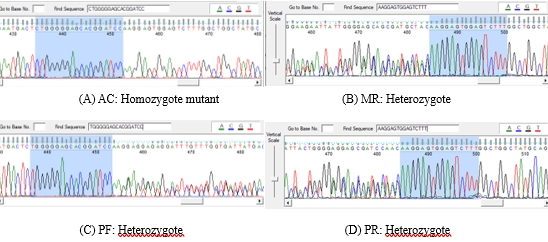Novel mutations of PCCA and PCCB genes found by whole-exome sequencing related to propionic acidemia patients
Abstract
Propionic acidemia (PROP) is an autosomal recessive inherited metabolic deficiency caused by multimeric mitochondrial enzyme propionyl‐coenzyme A (CoA) carboxylase (PCC). PCC enzyme contains a and b subunits, encoded by the PCCA and PCCB genes that mutations in both subunits are related to propionic acidemia. About 50% of disease-causing variants have been found in PCCA and most mutations related to propionic acidemia are missense mutations. The present study involves three families that are suspicious to hereditary propionic acidemia syndrome. The first family has four, the second family has one, and the third family has two passed-away children. All these families were diagnosed with the same clinical conditions such as poor feeding, vomiting, hypotonia, and lethargy. In the process of finding and confirming the mutation, pathological tests and whole-exome sequencing and sanger sequencing were done. In order to pathological tests and whole-exome sequencing, this is the first report of three novel variants related to propionic acidemia: 1. Novel pathogenic homozygous NM_000532.5: c.503_505del: p.Glu168del mutation of the PCCB exon5 gene, 2. Novel pathogenic homozygous splicing NM_000282:c.1900- 1G>A mutation of PCCA exon22 and exon21, 3. Novel compound heterozygous pathogenic NM_000532.5: c.503_505del: p.Glu168del and likely pathogenic NM_000532.5:c.539T>C: P.F180S mutation of the PCCB exon5 gene. The study shows that PCCA and PCCB have a great role in hereditary propionic acidemia and the results of the present study may be of importance in genetic counseling and finding the best treatment of this syndrome.
Downloads
References
2. Chapman KA, Bush WS, Zhang Z. Gene expression in cell lines from propionic acidemia patients, carrier parents, and controls. Mol Genet Metab. 2015; 115(4): 174-179.
3. Saleemani H, Egri C, Horvath G, Stockler-Ipsiroglu S, Elango R. Dietary management and growth outcomes in children with propionic acidemia: A natural history study. JIMD Rep. 2021; 61(1): 67-75.
4. Longo N, Price LB, Gappmaier E, Cantor NL, Ernst SL, Bailey C, Pasquali M. Anaplerotic therapy in propionic acidemia. Mol Genet Metab. 2017; 122(1-2): 51-59.
5. Ugarte M, Pérez-Cerdá C, Rodríguez-Pombo P, Desviat LR, Pérez B, Richard E, et al. Overview of mutations in the PCCA and PCCB genes causing propionic acidemia. Hum Mutat. 1999; 14(4): 275-282.
6. Sakrani NF, Kul Hasan H, Ibrahim A, Al Jubeh J, Al Teneiji A. Novel mutation causing propionic acidemia associated with unexplained autoimmune thyrotoxicosis. Mol Genet Metab Rep. 2021; 29: 100806.
7. Stelzer G, Rosen N, Plaschkes I, Zimmerman S, Twik M, Fishilevich S, et al. The GeneCards Suite: From Gene Data Mining to Disease Genome Sequence Analyses. Curr Protoc Bioinformatics. 2016; 54: 1.30.1-1.30.33.
8. Maglott D, Ostell J, Pruitt KD, Tatusova T. Entrez Gene: gene-centered information at NCBI. Nucleic Acids Res. 2011; 39(Database issue): D52-57.
9. Tarrada A, Frismand-Kryloff S, Hingray C. Functional neurologic disorders in an adult with propionic acidemia: a case report. BMC Psychiatry. 2021; 21(1): 587.
10. Kopanos C, Tsiolkas V, Kouris A, Chapple CE, Albarca Aguilera M, Meyer R, Massouras A. VarSome: the human genomic variant search engine. Bioinformatics. 2019; 35(11): 1978-1980.
11. Einhorn Y, Einhorn M, Kamshov A, Lev O, Trabelsi A, Paz-Yaacov N, Gross SJ. Gene-specific artificial intelligence-based variant classification engine: results of a time-capsule experiment. Research Square, 2019, DOI: 10.21203/rs.2.11834/v1.
12. Quang D, Chen Y, Xie X. DANN: a deep learning approach for annotating the pathogenicity of genetic variants. Bioinformatics. 2015; 31(5): 761-763.
13. Ionita-Laza I, McCallum K, Xu B, Buxbaum JD. A spectral approach integrating functional genomic annotations for coding and noncoding variants. Nat Genet. 2016; 48(2): 214-220.
14. Shihab HA, Rogers MF, Gough J, Mort M, Cooper DN, Day IN, et al. An integrative approach to predicting the functional effects of non-coding and coding sequence variation. Bioinformatics. 2015; 31(10): 1536-1543.
15. Tian Y, Pesaran T, Chamberlin A, Fenwick RB, Li S, Gau CL, et al. REVEL and BayesDel outperform other in silico meta-predictors for clinical variant classification. Sci Rep. 2019; 9(1): 12752.
16. Liu X, Li C, Mou C, Dong Y, Tu Y. dbNSFP v4: a comprehensive database of transcript-specific functional predictions and annotations for human nonsynonymous and splice-site SNVs. Genome Med. 2020; 12(1): 103.
17. Schwarz JM, Cooper DN, Schuelke M, Seelow D. MutationTaster2: mutation prediction for the deep-sequencing age. Nat Methods. 2014; 11(4): 361-362.
18. Vaser R, Adusumalli S, Leng SN, Sikic M, Ng PC. SIFT missense predictions for genomes. Nat Protoc. 2016; 11(1): 1-9.
19. Burley SK, Bhikadiya C, Bi C, Bittrich S, Chen L, Crichlow GV, et al. RCSB Protein Data Bank: Celebrating 50 years of the PDB with new tools for understanding and visualizing biological macromolecules in 3D. Protein Sci. 2022; 31(1): 187-208.
20. Huang CS, Sadre-Bazzaz K, Shen Y, Deng B, Zhou ZH, Tong L. Crystal structure of the alpha(6)beta(6) holoenzyme of propionyl-coenzyme A carboxylase. Nature. 2010; 466(7309): 1001-1005.
21. Rozman J, Rathkolb B, Oestereicher MA, Schütt C, Ravindranath AC, Leuchtenberger S, et al. Identification of genetic elements in metabolism by high-throughput mouse phenotyping. Nat Commun. 2018; 9(1): 288.
22. Pérez-Cerdá C, Merinero B, Sanz P, Jiménez A, García MJ, Urbón A, et al. Successful first trimester diagnosis in a pregnancy at risk for propionic acidaemia. J Inherit Metab Dis. 1989; 12 Suppl 2: 274-276.
23. Muro S, Perez-Cerdá C, Roddríguez-Pombo P, Pérez B, Briones P, Ribes A, Ugarte M. Feasibility of DNA based methods for prenatal diagnosis and carrier detection of propionic acidaemia. J Med Genet. 1999; 36(5): 412-414.
24. Shchelochkov OA, Carrillo N, Venditti C. Propionic Acidemia, in GeneReviews(®). Ed. Adam MP. 1993, University of Washington, Seattle.


This work is licensed under a Creative Commons Attribution 4.0 International License.




